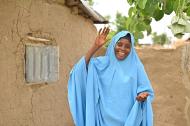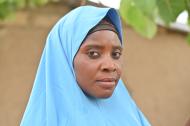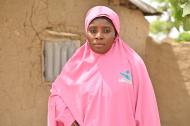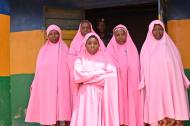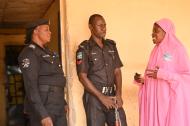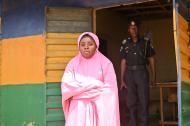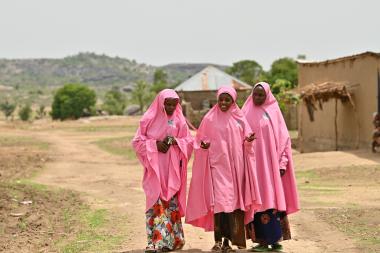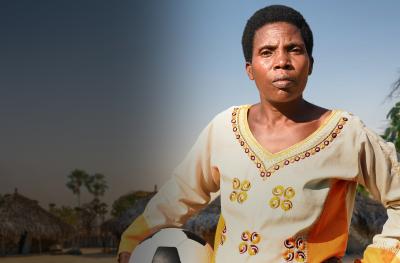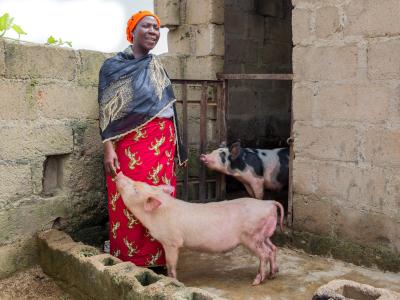
Changing cultural norms is not an easy task, especially when you are a woman in a remote village in Nigeria. But Hadiza is a testament to women’s power and strength. #SheDares to fight for women’s rights, even when it threatens her personal safety.
My name is Hadiza; I’m a mom of seven children and have two grandchildren. I lost my husband in 2020 when my youngest son was only 5 months old. Like any girl in my village, I was raised thinking that marriage would be the ultimate goal of my life. Therefore, I got married when I was only 12 years old, which is why I quit school. I must confess I regret this decision every day of my life. My first child was born when I was only 14 years old. I was a child taking care of another child and trying to deal with a life full of responsibilities.
In 2001, when I had two children, we started to experience crises in Shendam, Plateau State. My husband had left us home to go to the mosque to pray when the attacks began, and our house was burnt down. I left my home with my kids immediately, only with our clothes on our bodies. I ran with some neighbors for over six hours to get to another village. We stayed in this town for two days, and I could barely eat because of fear. After two days, I could finally meet my husband. He had also come to the village together with some other people from Shendam. After this traumatic experience, we came to Bauchi, where the then-governor provided all those who had been displaced with food. A good Samaritan gave us his house to stay in until we were able to get a place of our own. We waited for a year, after which my husband got a piece of land and built a house for us to live in.
I learned about Women for Women International and the Stronger Women, Stronger Nations program from a neighbor. I hesitated initially because some other organizations had deceived us several times, but I decided to try and join. Since I needed to drop out of school at a tender age to get married, I thought that it would be interesting to get some knowledge that I wasn’t able to in the past.
I have had so many successes from participating in the Women for Women International program. One of them is learning about my rights and, since then, I have not allowed anyone to trample on what I know is right.
After my husband’s death, his family came over to me, trying to force me to marry someone. They threatened me, saying they would take my children away from me if I didn’t marry this person. They believed that a woman is incapable of taking care of herself and her kids if she’s not with a man.
I dared to tell them I was not going to get married because I did not want to start the life of a married woman all over again.
To get married or not is a choice, and I have learned that no one should force their decision on another person.
Somehow, I could understand them. I also used to believe that. I had little children at that time, but my one-year journey in the Stronger Women, Stronger Nations program taught me that I can care for myself. I needed to prove to my in-laws that I was able to do it by myself, without a man.
After my husband’s death, as was a cultural norm at the time, my in-laws also collected my land. It was thanks to the knowledge I gained in the program that I was able to reverse it.
At first, I was afraid to take steps to secure the land because I knew that most of the time, people do not respect women when it comes to land issues. People usually feel such matters can and should only be handled by men, and as such, no one would listen to me. But, I was encouraged by my trainer who reminded me of the things we had learned about rights being the entitlement of all humans, irrespective of whether they are male or female.
This gave me the boldness I needed to make the move.
The Ward head of my community called me to provide another piece of land, but I stood my ground, insisting that I only wanted the land that belonged to my late husband. I also received some legal support from one of the lawyers under Women for Women International’s Men’s Engagement Program. I went to the Bauchi Local Government Council, where I was asked to bring along witnesses for the purchase of the land, after which I was issued papers as the valid owner.
I am forever grateful that I did not allow my fears to deter me from making a wise decision which is benefitting me and my children.
I now use the plot of land to farm vegetables, maize, and groundnuts for our family’s consumption.
Another achievement was being nominated and selected as a Change Agent in my community. And becoming a leader of the Change Agents afterwards. The journey so far has been a wonderful experience.
Women for Women International has trained me on different occasions; I attended seven days of training for Change Agents on “Effective Communication and Advocacy Skills” and consultation and linkages meeting with stakeholders in my State.
After the training, my fellow change agents and I conducted several advocacy visits to community stakeholders after identifying the need for a Police stand in our community. The Police Station for the local government was situated in another district not so close to ours.
Our request was granted, and today, we have a Police stand. A female police staff was brought in to make addressing female issues easier.
I also represented Change Agents in my community on a radio program to talk about gender-based violence issues affecting women in my community. This helped to create awareness about women's issues in the broader audience.
I was also selected as a federation leader for attending a meeting of Village Savings and Loans (VSLA) federation leaders and training on “Leadership and Conflict Management” for VSLA federation leaders. These have allowed me to increase my knowledge and improve upon my skills in Village Savings and Loans (VSLA) skills and leadership. For a person without formal education, I am so proud of myself for accomplishing so much!
I became an advocate for women in my community. I could see the change in myself sparking change in other women, so I couldn’t stop.
So far, as Change Agents, we have handled eight major cases of gender-based violence apart from other small ones. One involved rape, four wife violence issues, and three cases of men preventing their wives from accessing prenatal care. One of the perpetrators was a 63-year-old man who raped a 13-year-old girl. I remember handing over the case to the Divisional Police Officer in my community, and then I began to receive threats from his people because they wanted to pay their way out of the case. Still, I insisted it must be handled the proper way. A few months later, some of his people began to understand the reason why he should be made to pay for his crimes, and now, most of them have a cordial relationship with me. They have come to realize that it is good that an example be made of him so that it can serve as a deterrent to future would-be perpetrators of such crimes.
Working as the leader of Change Agents in my community has not come without its challenges. I’m grateful for Women for Women International for helping me to be resilient.
Even when I am afraid for my life, I remain resolute in my desire to see gender-based violence issues addressed. Being trained in the Stronger Women, Stronger Nations program has helped me develop the confidence I never imagined was possible for a local village woman to have.
One time, while handling one rape case, I had to run away from home to stay with my mother in Plateau State for two months, after which I returned. Some men in the community who felt I was a threat to traditional norms and their masculine authority would insult me whenever they saw me.
I was afraid, of course, but that did not deter me from standing my ground in fighting gender-based violence issues.
On many occasions, I have been called upon at all times of the day to attend to gender-based violence cases, only to return home late at night, sometimes as late as 10pm or 11 pm. I have to make myself available whenever I am called upon, which means leaving my children, especially my little son.
But seeing my efforts pay off only strengthens my resolve to see a drastic reduction and, if possible, end violence against women in my community.
I can only look to the future with a smile because I know that living life to the fullest is possible for every woman. We need to support one another in addressing the daily issues of women and dare be ready to take a stand for one another.
I thank Women for Women International for giving women the opportunity to take their lives back.
